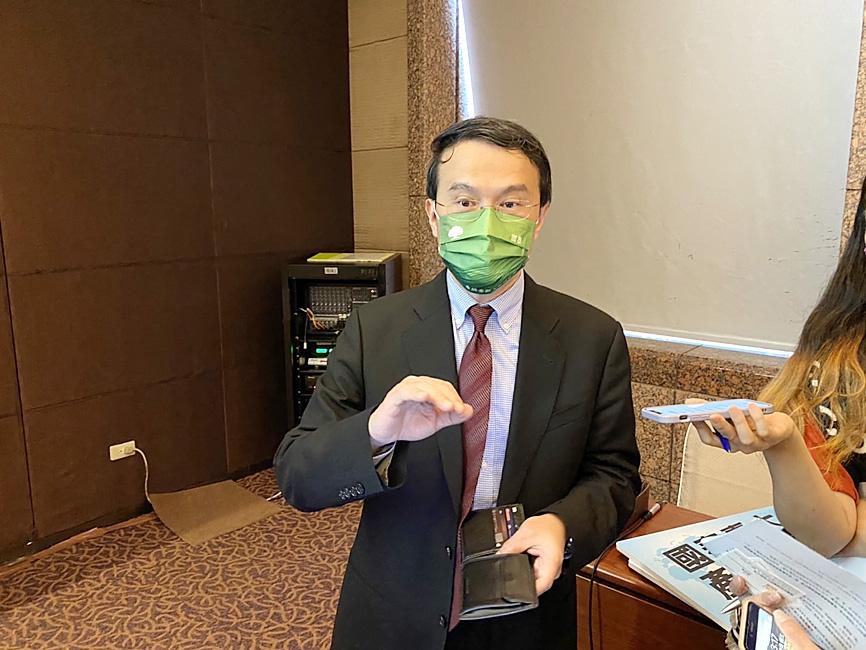Cathay Financial Holding Co (國泰金控) has revised downward its forecast for local economic growth from 3.9 percent to 3.7 percent, as the Ukraine war has caused food and metal prices to rise, worsened inflation and dampened global demand, it told a news conference in Taipei yesterday.
It is the first time the financial conglomerate has lowered its forecast for this year — it predicted an annual GDP growth of 3.5 percent in September last year and raised the figure to 3.9 percent in December, Cathay Financial data showed.
“The Ukraine war is the main reason for our revision. Although Russia and Ukraine account for less than 2 percent of global GDP, they are key suppliers of wheat, metal and energy, and the war in Ukraine has driven up prices of oil, food and metals,” said National Central University economics professor Hsu Chih-chiang (徐之強), who heads a research team commissioned by Cathay Financial.

Photo: Allen Wu, Taipei Times
“These price increases will worsen inflation in the US, which was already high before the outbreak of the war. Serious inflation might lead to lower consumption and even to economic recession,” Hsu said, adding that the US Federal Reserve cut its GDP growth estimate to only 2.8 percent.
There is a strong correlation between the US and Taiwanese economies, as the US is an important economic partner, Hsu said, adding that Cathay’s research has shown that a drop of 1 percentage point in US economic growth correlates to a dip of 0.5 percentage points in Taiwan’s economy.
Although exports and investment this year are expected to maintain their momentum, they are unlikely to show a robust rise year-on-year because of a high comparison base last year, Hsu said, adding that private consumption is likely to be the main driver of local economic growth this year.
“High inflation in Taiwan might curb private consumption, but we still estimate good annual growth” in consumption, Hsu said, adding that spending weakened during a local COVID-19 outbreak last year.
Whether the central bank is to raise the benchmark interest rate again in June depends on local inflation, Hsu said.
The consumer price index in the first two months of the year rose 2.6 percent annually, and “if its growth surpasses 3 percent from March to May, there is an 80 percent chance that the central bank will raise the rate again,” Hsu said.
The government has other tools for controlling inflation, such as freezing electricity or transportation costs, and all of the tools are likely to be tried before the central bank hikes rates again, Hsu said.
The central bank would not necessarily raise the rate multiple times, as Taiwan’s inflation rate is much lower than in the US, he added.

UNCERTAINTY: Innolux activated a stringent supply chain management mechanism, as it did during the COVID-19 pandemic, to ensure optimal inventory levels for customers Flat-panel display makers AUO Corp (友達) and Innolux Corp (群創) yesterday said that about 12 to 20 percent of their display business is at risk of potential US tariffs and that they would relocate production or shipment destinations to mitigate the levies’ effects. US tariffs would have a direct impact of US$200 million on AUO’s revenue, company chairman Paul Peng (彭雙浪) told reporters on the sidelines of the Touch Taiwan trade show in Taipei yesterday. That would make up about 12 percent of the company’s overall revenue. To cope with the tariff uncertainty, AUO plans to allocate its production to manufacturing facilities in

TAKING STOCK: A Taiwanese cookware firm in Vietnam urged customers to assess inventory or place orders early so shipments can reach the US while tariffs are paused Taiwanese businesses in Vietnam are exploring alternatives after the White House imposed a 46 percent import duty on Vietnamese goods, following US President Donald Trump’s announcement of “reciprocal” tariffs on the US’ trading partners. Lo Shih-liang (羅世良), chairman of Brico Industry Co (裕茂工業), a Taiwanese company that manufactures cast iron cookware and stove components in Vietnam, said that more than 40 percent of his business was tied to the US market, describing the constant US policy shifts as an emotional roller coaster. “I work during the day and stay up all night watching the news. I’ve been following US news until 3am

Taiwan will prioritize the development of silicon photonics by taking advantage of its strength in the semiconductor industry to build another shield to protect the local economy, National Development Council (NDC) Minister Paul Liu (劉鏡清) said yesterday. Speaking at a meeting of the legislature’s Economics Committee, Liu said Taiwan already has the artificial intelligence (AI) industry as a shield, after the semiconductor industry, to safeguard the country, and is looking at new unique fields to build more economic shields. While Taiwan will further strengthen its existing shields, over the longer term, the country is determined to focus on such potential segments as

COLLABORATION: Given Taiwan’s key position in global supply chains, the US firm is discussing strategies with local partners and clients to deal with global uncertainties Advanced Micro Devices Inc (AMD) yesterday said it is meeting with local ecosystem partners, including Taiwan Semiconductor Manufacturing Co (TSMC, 台積電), to discuss strategies, including long-term manufacturing, to navigate uncertainties such as US tariffs, as Taiwan occupies an important position in global supply chains. AMD chief executive officer Lisa Su (蘇姿丰) told reporters that Taiwan is an important part of the chip designer’s ecosystem and she is discussing with partners and customers in Taiwan to forge strong collaborations on different areas during this critical period. AMD has just become the first artificial-intelligence (AI) server chip customer of TSMC to utilize its advanced